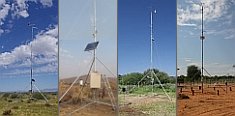|
Objectives: S11 aims at developing realistic land use scenarios with regard to maintaining bio-diversity and developing sustainable agriculture. Concepts for rangeland-use will be developed that allow a simulation of alternative land use practices in different agri-ecological zones and under varying population densities. These concepts take into consideration income and food security needs of the population. In a modelling approach various farming systems and property rights regimes, such as large scale, small scale and community owned rangeland farming, will be analysed in order to provide a spectrum of suitable management practices for different rangeland ownership types. These types may essentially shape the future of Namibian pastoral lands. The research outcome is of great importance for further land use policy in Namibia. Finding sustainable agriculture practices is understood as pursuing ecological, economic, and social goals for the benefit of the people of Namibia.
Project tasks: Besides climate, anthropogenic factors such as grazing history and rangeland management have a major impact on the development of bio-diversity. The BIOTA project S 11 aims at:
- Identifying and analysing the actual land use practices and animal husbandry systems,
- Identifying suitable management practices for bio-economic models and rangeland policy,
- Assessing use rights over resources, organisational structure, and national tenure policies.
Methods and scientific program:
Livestock production and management of livestock production systems along the transect
Formal and informal interviews with individual farmers and key informants, and group discussions, using participatory methods (RRA/PRA tools), will be used to obtain baseline information about the actual livestock production systems on household/farm and village levels for different user groups. Information about actual and past stocking density and grazing management will be mapped and linked to aerial photography /satellite imaging, and key resources subject to detailed botanical investigation. Local knowledge will be linked to scientific knowledge to develop local and simple methods of rangeland assessment. PRA will be used to obtain information about rich and poor households in communities, to assess their dependency on natural resources or purchased inputs, and to quantify the impacts of different property regimes. This will bring a discussion about grazing strategies of user groups in Namibia depending on property rights.
Rangeland management and simulation of its impacts on the environment
A bio-economic model will be developed that allows simulations of alternative land use concepts in Namibia. Ecological goals of preserving natural resources and bio-diversity as well as combating soil degradation, range degradation and water depletion are pursued. The model contains nature as a common property that requires maintenance and efforts of all farmers. To provide its functions to humans, nature is treated as natural capital to be created and preserved. Farmers will maximise long run pay-offs from investment in range quality. Quality improvements from waivers in the use of sensible resources are recognised as long-term investments. The model shows the potential for creating rural livelihoods in relevant agri-ecological zones of Namibia.
Institution economics, property rights to land and water, and resource policy
By semi-structured interviews, a survey on the community level will provide information on local institutions for the management of different resources and their organisational structure. The survey will focus on the identification of potential choices on property rights regimes at user group levels in Namibia. The basis of collective action for investments in resource maintenance and regional organisation shall be assessed. An entitlement survey will result in information about transaction costs, access to products and factor markets, occupation and incomes. A legal survey will investigate present and past land and water tenure legislation. Pathway analysis and methods of political economy will be used for data analysis.
Partners in Germany: Dept. of Livestock Ecology, Justus-Liebig-University Giessen (Dr. Irene Hoffmann (co-ordinator), Prof. J. Steinbach); Dept. of Agrarian and Environmental policy, Justus-Liebig University Giessen (Prof. E. -A. Nuppenau); Dept. of Institution Economics, Philipps-University Marburg (Prof. M. Kirk); Institute of Anthropology, University of Cologne (Dr. M. Bollig); Institute of Anthropology, University of Hamburg (Prof. H. Lang)
Partners in Namibia: BIOTA agreed with the Faculty of Agriculture and Natural Resources, UNAM (Prof. O. Mwandemele) to create an opportunity for capacity building of BSc and MSc students and staff training. Justus-Liebig-University is currently involved in curricula development at FANR. The Agricultural Laboratory of Namibia, interested in enlarging the national feed database, will conduct feed analyses. We also intend to establish links to the Desert Research Foundation of Namibia.
|






 Go to the WeatherNet
Go to the WeatherNet